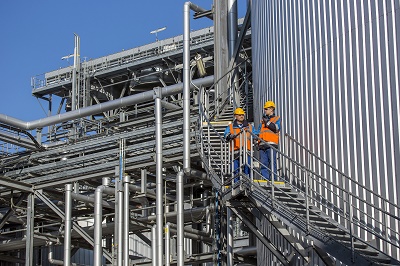BASF inaugurated its new TDI (toluene diisocyanate) plant at its Ludwigshafen site. With an annual capacity of 300,000 metric tons of TDI, the new facility was constructed at a total investment of over €1 billion,, the biggest investment ever made at the site.
The inauguration ceremony was attended by Sigmar Gabriel, Vice-Chancellor of Germany and Minister of Economic Affairs and Energy, and Malu Dreyer, Minister-President of the state of Rhineland-Palatinate. Minister Gabriel noted that this forward-looking project of BASF is an innovative step, as well as an important building block in maintaining Germany’s industrial base.
In her welcoming address, Minister-President Malu Dreyer stressed the importance of this investment for the region since BASF is the largest company in the state of Rhineland-Palatinate and makes a decisive contribution to the region’s economy. The new plant generates 200 new jobs and stands for state-of-the-art German technology.

Dr. Kurt Bock, Chairman of the Board of Executive Directors of BASF SE, said that the new plant is one of the most modern and competitive facilities in the world.
The TDI complex comprises plant components that produce DNT (dinitrotoluene), TDA (toluylendiamine) and TDI (toluene diisocyanate). It also involved the updating and expansion of production facilities for key precursors in the Verbund. In addition, BASF made investments in the infrastructure that supplies steam, electricity and water.
TDI is a core component for polyurethanes. It is often used in the furniture industry (elastic foams for mattresses, cushions or wood coating) and the automotive industry (seat cushions). BASF operates TDI plants in Yeosu, South Korea; Caojing, China; and Geismar, Louisiana, which have a combined capacity of 480,000 metric tons. The plant in Schwarzheide, Germany, will gradually be taken out of operation once the plant in Ludwigshafen starts up.

 iConnectHub
iConnectHub
 Login/Register
Login/Register Supplier Login
Supplier Login



























